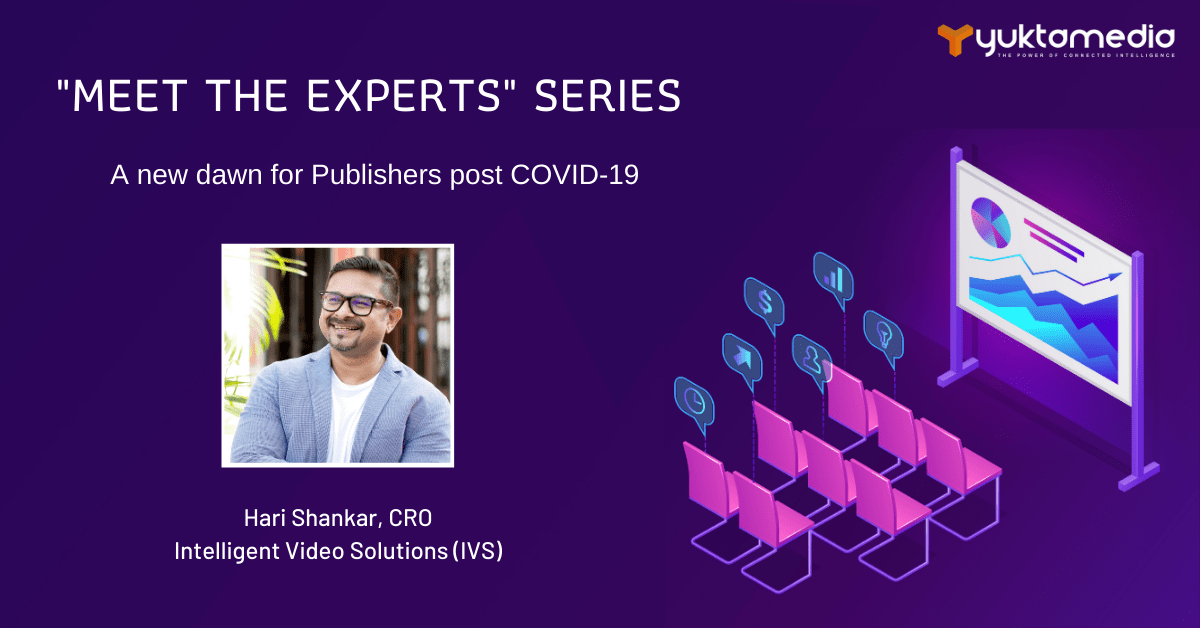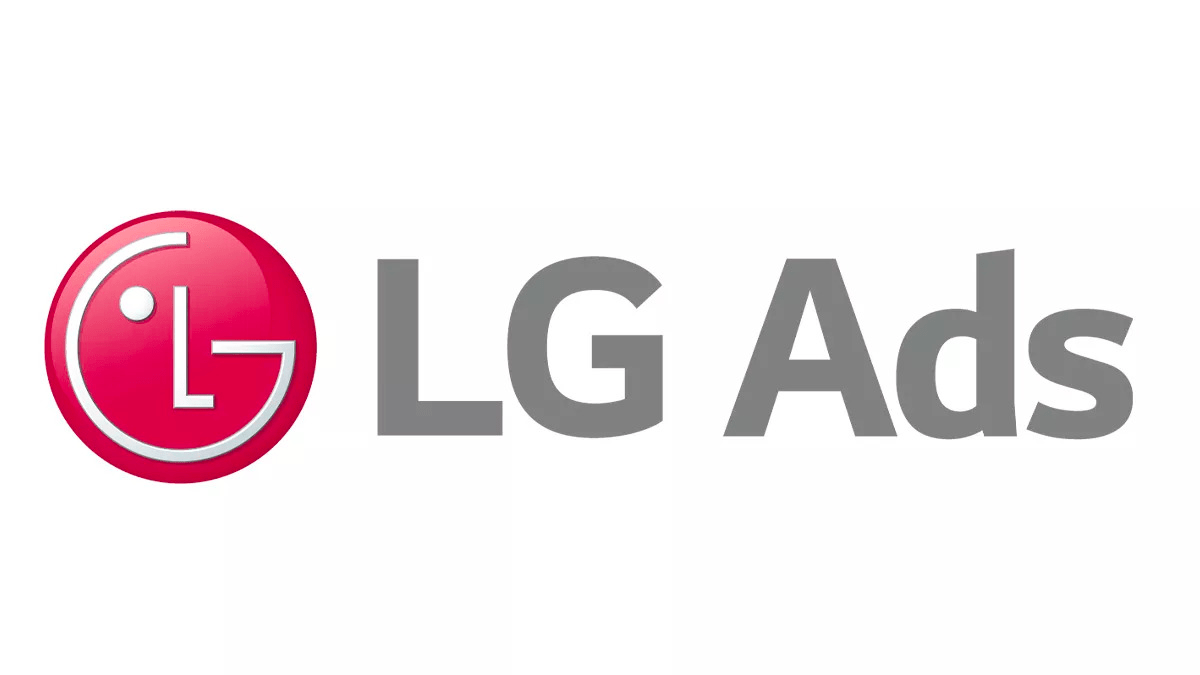YuktaMedia is excited to introduce the eighth speaker in the “Meet The Experts” series. The objective of this series is to interview leading professionals in the digital publishing industry around the globe. The goal is to learn from the experts, especially now, that the Publishing industry is hurting the most. We hope that by sharing and learning from each other’s experiences Publishers will continue to not only survive but thrive over the years to come.
Our eighth interview in the “Meet the Experts” series is with Hari Shankar. Hari is the CRO of Intelligent Video Solutions (IVS), a leading premium video programmatic marketplace in SEA. Prior to this, he was the founding CEO of Singapore Media Exchange (SMX), the only premium publisher consortium in Singapore. In his previous capacities, he has served as the Head of digital acquisition APAC at PayPal, MD of Performance marketing at Havas Media Group, and also was the architect of the largest performance marketing agency brand in the region, Performics.
We are grateful to Hari Shankar for taking the time out of his busy schedule and participate in this initiative of giving back to the Publishing community.
Aditya Bhelande – COVID-19 has added to the misery of already hurting Publishers. Looking back what and where did things go wrong for Publishers?
Hari Shankar – The origination point of the so-called misery are the budgets drying up to a large extent during the Covid period – brands either deferring the spending or cutting budgets altogether or playing the watch & wait game. And that means brands loosening their purse strings only in line items that are known to give returns or are perceived to be known to give returns – which is where the duopoly comes into the picture.
When a company amasses large audiences via acquisitions of platforms and creates a self-serving demand-supply tech environment, that over time creates a closed eco-system designed to restrict the market from growing and flowering to its full potential. These closed eco-systems – more commonly known as Walled gardens – are the line items that brands tend to spend on when it comes to a drought situation.
This in turn has a direct negative impact on publisher revenue – being the original content creators with large investments in bringing the content to the consumers – there is a lot at stake here while the duopoly rakes in the moolah at the expense of the wider market out there.
The lockdown climate created a landmark acceleration in the video space; more specifically the OTT space which meant that any platform with audience scale & video benefited. And that obviously meant most of the investments went towards YouTube and Facebook; having built the necessary infra to cash in on the oncoming video explosion – except that the explosion started much earlier. Media agencies being the custodians of brand spends also caught up in the quagmire created by Covid, played ball because investing with the duopoly would need the least of justification to clients (except in more advanced markets) and arguably has the highest ROI for themselves, in more ways than one.
So, while the branding aspect gravitated towards the video space as above, the performance marketing space once again came to fore yoked firmly on the Covid steed – which is a desirable development in my own opinion – but that again meant that the dollars flowed more towards ‘pull’ media like Search marketing. In short, Covid only went further towards creating a climate even more conducive for the duopoly, especially in the Video, Search and Social planes. But the good news is that all has not been doom and gloom, especially with the open web players providing adtech product avenues for increasing the value of inventory of publishers.
Aditya – With Publisher revenues dwindling, would it make sense for Publishers to invest in any technology / platform (SaaS or in-house)? If yes, which business areas / technologies would you suggest?
Hari – The need for the moment is not more investment but lesser investment in addition to pruning cost items that have hitherto been paid the least attention to, in a normal market scenario. This could include hosting costs, streaming costs, DMP costs, tech middlemen costs, so on and so forth. When it comes to ad monetization, what really is required is for publishers to start providing even bigger value to their website visitors and look for strategies to house them within their environments as much as possible. Every month, there is a large quantum of inventory that goes unmonetized which gets assigned to house ads and this is common to most of the publishers I have come across in the SEA region. The focus should be on conceptualizing new solutions and forging new partnerships that add a ‘twist’ to the unsold inventory so that they may be liquidated.
There are many interesting technologies out there that could transform a normal ad placement to a more marketable form factor which could make a significant difference to publishers. There are also many platforms out there that can help shave infra costs while bringing additional revenue over and above publisher sales motion.
In short, the game should be about cost optimization via partnerships on the one hand and leveraging upon those partnerships to bring incremental revenue through the other hand, while looking for ways to transform inventory towards better ‘sellable’ status – all in tandem.
Aditya – With 3rd party cookies going away soon, what steps do you think Publishers should take so that they are ready to brace the impact on revenue and business in general?
Hari – The demise of the 3rd party cookie was slowly looming on the horizon and publishers in developed markets have been gearing up towards identifying their visitors in a more deterministic fashion for a while now. Except that the big challenge has been acquiring critical mass for login type handles that can serve as the yoke for the deterministic journey. As far as the publisher goes, the best bet is to identify and grow a persistent ID beyond the cookie such that in-site deterministic targeting becomes a reality, at least via their current ad-serving / ad tech platforms.
Meanwhile, the ad tech industry is on a mission to develop the open ad id solution – both on the SSP side of things and the DSP side of things so that the market may have a common currency to transact on, thus hopefully ushering in a climate that is a lot more pro the eco-system outside the walled gardens. This will enable the publisher world to provide a robust ground for buyers to identify, target, re-target, and convert publisher audiences (almost) as people and not as faceless cookies.
In short, the immediate focus of publishers should be to develop a cookie-less solution within their own properties and facilitate synch with leading SSPs to be able to programmatically transact meaningfully. Long-term, the ability to maximize the potential lies in partnering with the right platform/s out there that have found widespread adoption on the buy-side.
For example, the Unified ID 2 initiative from TTD that is being supported by SpotX would be a good place for publishers to start given that the effort is to develop an opensource framework that allows publishers to collect persistent handles which in turn will be enriched & transacted upon by the DSP & SSP eco-system.
When this initiative gathers critical mass, the open web will finally have a large enough deterministic data pool that buyers can tap into. Pyramids were not built in a day, so it will take time, effort, and most importantly serious collaboration between the parties involved.
Aditya – How should Publisher manage their audiences, related data and leverage these from a monetization perspective?
Hari – I have touched upon this above, but the long and short answer is – the goal post has moved from a first-party cookie to be able to transact via a persistent ID in the post-3P cookie era. So, publishers who have harnessed their 1P data to an extent will have an edge over publishers who haven’t even started the journey in the sense that if an opensource framework facilitates a persistent handle, then the early-adopter publishers will be in a good position to have an enriched data pool for activation both in their network as well as outside. But publishers who haven’t yet started that journey will indeed have a longer path to tread, both in terms of building a meaningful data pool and also strategizing about data monetization across programmatic and non-programmatic routes.
Creating and maintaining a DMP is not exactly a cost-effective proposition unless there is a solid monetization engine working to rake in the moolah but the sad reality in this part of the world especially, is that publisher 1P data monetization potential is severely restricted by the duopoly for obvious reasons. So sure, there are many publishers who have invested in DMP vendors by parking it under ‘enabler’ cost but then if they were to compare the data monetization revenue Vs the DMP vendor fee neck to neck, the case for a DMP vendor quickly crumbles.
Aditya – There have been some talks about Publishers forming consortiums to take on BIG Tech. Is that feasible? What would be the challenges and is there a way to make a consortium successful?
Hari – This is a rather large topic, especially for me, as the ex-CEO of the only consortium in Singapore that I happened to set up & lead; the JV between the two large media conglomerates in the country. There have been many a trial forming consortia starting with Europe, US, NZ, and then closer home here in SEA. I am not going to take names of the majority that have had to down the shutters almost immediately after inception due to the loose coupling between partners or the others who started out with fanfare but aren’t really going anywhere as we speak due to the individual publisher org dynamics involved or the rare one that did manage to crack it but unfortunately had to bite the dust because a key publisher decided to bail out due to ‘org restructure and change of strategy’.
So, is it feasible? Sure, but that requires a true ‘band of brothers’ attitude between the ones who form the consortium, to begin with; else it will be akin to herding cattle for the consortium leadership, eventually becoming a Damocles sword for the consortium leadership. Which is why strong central governance forged through collaboration, trust, and serious want to make it work reinforced by the authority to quash any negative undercurrents (an eventuality) within those organizations, should be first established. This is because, consortia that run on a programmatic marketplace model have the might to bite off a chunk of the publisher media sales force personnel; a part for which the time may have come but as with all changes for the better in this world, the retarding forces can be colossal for obvious reasons.
EOD it is about establishing a clear R&R for the publisher sales force Vs the consortium so that there is no avenue for the publisher sales force to act detrimental to the interests of the consortium. The other important piece is also the absolute necessity to ensure that the consortium governance constitutes individuals who have enough marketplace experience, domain knowledge, and maturity – besides the genuine want to make it successful – to support the consortium & steer it towards success. A factor that was entirely lacking, per my own experience, and is likely to be so whenever a consortium is born.
Last but not the least, the consortium leadership with all of this, is it feasible? Yes, given the right conditions and right people. But is it probable? I would say it is within the zones of subjective Bayesian probability.
Aditya – How will the rise of OTT impact traditional web Publishers (News, Finance, Sports, etc.)? Is there potentially an opportunity for web Publishers?
Hari – I think we should reconsider the comparison plank here because, to me, these are 2 different markets being addressed with the different offerings and a different audience need-set. The rise of the OTT for that matter has been accelerated purely due to the pandemic scenario although the video industry has been on the road to making it big in the past few years. Whereas for traditional web publishers, the business model has always been different and largely depending on genuine, high-quality journalism that always has had a loyal audience. Obviously, it is a non-starter for such a publisher to shape-shift and joins the OTT fray.
But if the question is whether there is an OTT rub-off effect that the traditional publisher can leverage upon, I would be inclined to say yes, given that these publishers do have truck-loads of quality content (and the ability to produce such content) which can be consolidated behind free sign-on access and this, immediately offers two exciting opportunities to the publisher – one being the ability to build the post-cookie solution and two, the ability to monetize premium viewership at a higher yield.
At present, such video content is playing freely across article pages which certainly is baseline but in addition to this, there would be videos that play behind the walls of premium article content as well which can be monetized at a higher rate. With enough scale, the demand partner & monetization strategies outside and inside the wall would be markedly different as well. In short, there is a definite opportunity and as I said earlier, the baseline to that is creating high-quality content to play alongside articles in as much contextual manner as possible.
Aditya – Do you believe that Publishers in Singapore (or South East Asia in general) today have a global presence similar to say a New York Times / Economist / Guardian? What suggestions would you give to aspiring Publishers in Singapore (or South East Asia in general) to get there?
Hari – The short answer would be a No given the cultural and linguistic diversity in SEA that calls for well-defined homegrown publications to feed the home market. Any global presence of publishers from here would be to serve the diaspora in those global markets and quite obviously so. I would say that the content consumption propensity originating from here into global out shadows the inbound propensity originating from global markets. The premium publishers you mentioned are truly global publications that serve a certain kind of premium audience and in that sense, they appeal to that homogenous audience bucket transcending geo barriers. But in my knowledge at least, there isn’t a need factor of global audiences that could be addressed by publishers in the SEA region on a sustained basis. That said, there could be some niches like Financial markets that can court a global audience but they will remain niches.
Aditya – What would be your top three recommendations for Publishers as they try to get through COVID-19 and beyond?
Hari – I would say top 4 and those are:
- Embrace programmatic wholeheartedly
- Embark upon the data journey without further ado
- Create and grow premium video inventory
- Innovate constantly – to grow addressable inventory and to minimize unsold inventory
Aditya – Any other question / comment from your side.
Hari – I believe it is the collective responsibility of the open web – publishers, ad tech vendors, buy/sell-side platforms, creative platforms, the eco-system – to create a climate that is conducive for buyers to invest more outside the walled gardens. Revenue pressure is a given for everyone and for the publishers, there is a significant dependency on the duopoly for revenue; but as the industry is now being cajoled and coaxed into the unified id thinking, this presents a great opportunity for the open web to usher in that climate that should eventually see more dollars migrating from within the walls to the open web.
The few thoughts I shared above are all with this objective in mind and that is what I hope to see transpire too. I do hope to see solutions like the UID2 from TTD gathering critical adoption and allowing the open eco-system to grow & thrive.
———————————————————————————————————————————————————————————
Want to participate or nominate your expert? Reach out to us at info@yuktamedia.com




 Talk to a Media ERP Specialist
Talk to a Media ERP Specialist

















